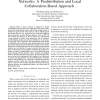Free Online Productivity Tools
i2Speak
i2Symbol
i2OCR
iTex2Img
iWeb2Print
iWeb2Shot
i2Type
iPdf2Split
iPdf2Merge
i2Bopomofo
i2Arabic
i2Style
i2Image
i2PDF
iLatex2Rtf
Sci2ools
INFOCOM
2005
IEEE
2005
IEEE
Group rekeying for filtering false data in sensor networks: a predistribution and local collaboration-based approach
— When a sensor network is deployed in hostile environments, the adversary may compromise some sensor nodes, and use the compromised nodes to inject false sensing reports or modify the reports sent by other nodes. In order to defend against the attacks with low cost, researchers have proposed symmetric group key-based en-route filtering schemes, such as SEF [1] and I-LHAP [2]. However, if the adversary has compromised a large number of nodes, many group keys can be captured, and the filtering schemes may become ineffective or even useless. To deal with node compromise, the compromised nodes should be identified and the innocent nodes should update their group keys. Some existing intruder identification schemes can be used to identify the compromised nodes, but most existing group rekeying schemes are not suitable for sensor networks since they have large overhead and are not scalable. To address the problem, we propose a family of predistribution and local collaboration-based gro...
| Added | 25 Jun 2010 |
| Updated | 25 Jun 2010 |
| Type | Conference |
| Year | 2005 |
| Where | INFOCOM |
| Authors | Wensheng Zhang, Guohong Cao |
Comments (0)

